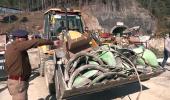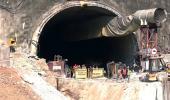The operation to rescue 41 workers trapped in the Silkyara tunnel may take a long time with the auger machine for horizontal drilling facing repeated hurdles, and rescuers are now preparing to start vertical drilling, the National Disaster Management Authority (NDMA) said on Saturday.

The vertical drilling will start in the next 24 to 36 hours, NDMA member Lt Gen (retd) Syed Ata Hasnain said, adding the front part of the auger machine was broken and efforts are being made to retrieve those from the tunnel.
"We need to have patience as it is a dangerous operation ... 'iss operation main lamba samay lag sakta hai' (this operation may take a long time)," he said, without mentioning any timeline for the completion of rescue operations.
According to Hasnain, this rescue operation is getting technically more complex every day.
Drilling at the collapsed portion of the Silkyara tunnel to rescue the trapped men halted again on Friday night after the auger machine engaged in drilling through the rubble to prepare an escape passage faced a hurdle, apparently a metal object, and busted.
The NDMA member said 47 meters of horizontal drilling have been done, and efforts are on to remove the broken part of the auger machine.
Rescuers are exploring other options such as drilling the remaining stretch manually and undertaking vertical drilling.
On the vertical drilling option, the NDMA member said that machines are being placed on a platform on top of the tunnel and vertical drilling operations will start in the "next 24 to 36 hours".

The second fastest way (after horizontal drilling) to reach the stranded workers would be top-down (vertical) drilling of 86 meters, he said.
Hasnain also said that a 1.5-km access road to the top of the tunnel on the Silkyara side has already been built by the Border Roads Organisation (BRO) for starting vertical drilling.
"We need to have some patience. We need to understand that a very difficult operation is going on," Hasnain said, and added two methods are being used currently, but a third method, that is drift method, may also be used.
"As per the prevailing situation, we need to keep the pipe stable, remove the broken parts of the auger, prepare to begin the drift on the side, prepare for top-down drilling, and stabilize and strengthen the 41 brothers trapped inside and keep monitoring their mental well-being, since this operation can go on for long," the NDMA member said.
He also said that advanced machinery is required to cut the stuck parts of the auger inside the tunnel, and the assistance of the Indian Air Force is being sought to airlift this machinery.
"Besides the two options being adopted now, we may perhaps adopt a third method of drift tunnel as well. However, there is no certainty about it yet," Hasnain added.
The multi-agency rescue effort began November 12 when a portion of the under-construction tunnel on Uttarakhand's Char Dham route collapsed following a landslide, trapping workers inside.
Asked to comment on micro tunnelling expert Arnold Dix's remarks that the 41 trapped workers would come home by Christmas, Hasnain said, "When you look at any problem from a distance, then you get the correct picture."
"'Wahan par se kisi ka yeh kehna ki 20 din ya 45 days lag jayega rescue karne me, toh main nahi samajhta hun ki woh shobha deta hai' (It will be insensitive on the part of anyone to say that rescue operation to bring workers out will take 20 days or 45 days)," he added.
Asked if an environmental impact assessment (EIA) had been conducted for the project, NHAI member Vishal Chauhan said, "EIA of this project has also been done. Himalayan geology behaves differently...There are several things that cannot be predicted."











 © 2025
© 2025